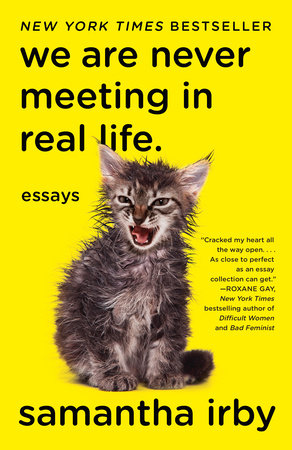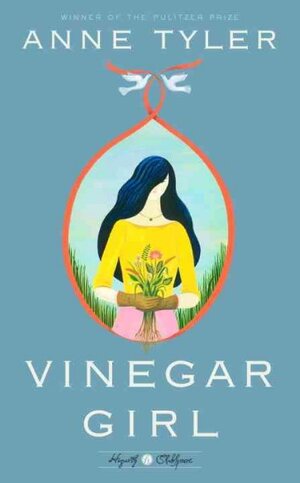Read in early May.
*Heavy spoilers*
This book is a modern-day retelling of Jane Eyre, which is one of my favorite books. I'd read about it on some YA blog a while back and made a mental note of it, but I didn't actually get this book until I came across it almost by accident in my favorite thrift store. While it is updated, it stays really close to the book. Recently orphaned Jane drops out of college to work as the nanny for a rock star's daughter. She's hired because she doesn't care about celebrities, but of course she falls in love with Nico the rock star blah blah wife in the attic, you know how it goes. The setting is the US East coast, and everyone who was English is now American, while the 'foreigners' are still p. much the same nationalities. The author said that she was struggling to figure out how to update the class differences (huge in the 19th century, not so much now) until she hit on the fame/celebrity thing.
I initially thought it was weird that this Jane was recently orphaned and had siblings she was estranged from (so she couldn't rely on them when her parents died), but Lindner actually combined Jane's dead parents with her abusive aunt's family, which really makes sense. Jane's brother is the abusive boy cousin, and her sister steps in for the prettier and cossetted yet selfish girl cousins. Her cold and neglectful mother who definitely favors her older two siblings over her and lets her know it all the time is basically the same person as the aunt (like if Lucille Bluth weren't funny at all), while her kind but emotionally distant and always steamrolled by his wife father is the dead uncle. It makes sense to combine the two families in this way, and it kind of makes it more heartrending since it is her own immediate family and not some semi-distant relatives who are obsessed with class and look down on her for living on their charity like in the original. It's worse, and her parents dying kind of keep Jane from being able to resolve these issues with them. The part of the book where Jane goes back to nurse her dying aunt and forgives her is turned into Jane going to visit her sister since her brother's crashing at her place after his ex-girlfriend (whom he also abused) kicks him out, and the sister wants him gone. Jane is able to get some closure re: his being a total psychopathic abuser, but it's not this touching "I forgive you!" stuff, but it makes sense that it wouldn't be. I wish he'd died in a bar brawl or whatever like the cousin in the original too; I didn't really feel like he got a comeuppance or what he deserved. We just saw that he's a pathetic awful mess and will always be that way since all his problems are his own fault and he refuses to see that.
Helen Burns is sidelined as her college roommate and former best friend that moves to Idaho or some such and doesn't really talk to her anymore, which kinda makes sense since pretty much everyone sees the meat of the story being in the Jane x Rochester dynamic, which it is, but her relationship with Helen is one of the most important in her life because it's pretty much the first person to show her real, unconditional love she didn't have to earn. No mention of the favorite teacher, either, from what I remembered. Adele is p. much the same as well. Her mom was a French pop star who took her toddler daughter to nightclubs all the time. Poor thing. I wish they'd let Adele keep her French; as a bilingual kid, keeping my native tongue is so important to me. There's like no French in this book.
The Rivers siblings become the St. John siblings (heh), and they are all pretty much the same. The boy is written like he might have like Aspergers or at least be intensely focused on things like Sherlock from the BBC show, and the sibling dynamic between them all is the same as well ("our brother's a genius with a heart for the poor!!" stop enabling him, sisters). The thing where St. John is attracted to a rich nice girl but refuses to consider dating her because mission work is there too; the only twist is that he doesn't want to get together with her and go with him not because she's so frail she'll probably die of tropical diseases, but because her dad owns some pharmaceutical company and he distrusts where her real loyalties lie. The ridiculously illogical pragmatism is the same. The mission field is in Haiti instead of India, which makes sense, and Jane practices French with him. The "Jane study Hindi with me instead of German" thing is replaced by volunteering at a soup kitchen. The creepy "Jane come be a missionary with me but we have to get married" thing is still there too but it makes even less sense than in the original since no one raises an eyebrow at girls and boys traveling together anymore; St. John's just like "we may as well be a couple since we have the same passions and we'll be working together all the time so it will probably happen anyway, who cares about attraction or chemistry" and it's somehow creepier in modernity.
Nico/Rochester's nonsense is unsurprisingly way creepier and controlling than in the original;
what kind of grown-ass fortysomething man playing all these games to manipulate an inexperienced nineteen year old girl, as I kept yelling throughout the book. The playful banter/we're arguing because\but we're in love thing where Jane really just has him in the palm of her hand (I think
Mallory referred to this as "topping from the bottom" [sorry, direct quote] but she may have been talking about
Pamela instead) is really sadly lost. Apart from her quietly but firmly not letting herself be showered with gifts and jetsetted around the world like a typical rockstar's girlfriend, there's none of that dynamic that makes their relationship be swoony or aspirational at all (not that you should aspire to this kind of relationship omfg please don't). You know what I mean? She has like 1/4th the power she has in the original, so it loses a lot of the fun. The awed gratitude is still there, but the exultation "finally somebody loves
me" is not. The "we are mental and spiritual equals, solemates" thing is mostly gone.
The Blanche Ingram character is the same, except she is an Annie Leibovitz type. I don't have much to say about her. That weird racist brownface g*psy thing that Rochester does just turns into a girlfriend of Nico's bandmate's reading Jane's tarot cards, which is less exciting and it's not like Nico had her rig their results. Nico's bandmates (he's a rock star, remember) all have girlfriends who are like models and stuff, and they are nice to and befriend Jane, which I liked.
Bertha is like a Brazilian socialite/model/Nico's wife that Nico got hooked on drugs and he feels guilty since it triggered her schizophrenia which keeps her murderous and violent and she refuses/will only pretend to take her medication and that's why he keeps her locked up in the attic. Nico's "DO YOU KNOW HOW AWFUL THOSE PLACES ARE, JANE???" when she reasonably asks him why he doesn't put Bertha in a mental institution where they actually have the facilities and teams of trained mental health professionals to deal with murderous schizophrenics instead of a perpetually drunk caregiver since this is unnecessarily endangering him, his staff, and HIS FIVE-YEAR OLD DAUGHTER, SERIOUSLY, loses a ton of weight since they don't chain crazies to the wall in damp, rat-infested basements or see mental illness as paramount to being a criminal (much) anymore. The mental illness thing isn't treated much better in the modern version than it is in the nineteenth century version; it's just updated with drugs and modern names.
Jane leaves Nico because he constantly lied to her when she gave him ample chances to tell her the truth, not because she's afraid she'll throw away her morals and live with him in sin as his mistress. This change makes sense since that's not the immoral, life-ruining thing it used to be seen as. I would have been interested to see how Jane's faith was updated and handled. I've always found it interesting that Jane, despite being religiously bullied by fundamentalist extremists at a girls' home, still developed a spiritual life that was important to her, in large part due to the important relationships she built up with her best friend and favorite teacher, both spiritual, loving people. Since both of those relationships were excised from the modern retelling, it makes sense that Jane's spirituality was too.
Here is the thing that bothered me most: you know after Thornfield Hall being set on fire and Rochester being maimed/blinded trying to save Bertha who jumps off the building and dies, then when Jane learns about this she immediately goes back to him? Well, instead of being penitent and repenting of his asshattish behavior, Nico is all "YOU LEFT ME JANE!!! HOW COULD YOU!!! I WAS IN AGONY WORRYING ABOUT YOU!!!" and Jane is all ":((( that was so wrong of me I'm so sorry my love!"
PUKE. F that S. SHE LEFT HIM BECAUSE HE LIED TO AND MANIPULATED HER! THAT'S ON HIM! As Peggy says in
Agent Carter, "You don't get to use my reaction to your behaviour as an excuse for your behaviour!" Nico/Rochester does not see the error of his ways or realize that what happened was because of him and his behavior and repent. He does not become humbled, only embittered. He doesn't go through this mental and behavioral change and develop a character and becomes the kind of man Jane deserves. This is the book/relationship's main redeeming quality. I am disappointed in this book because it's the most important part and it did not happen.
OH, ALSO, some mysterious relative does not die and leave Jane with a fortune of her own, which is the most important thing, relationships aside, that happens to Jane in the book. This is undoubtedly because then she'd have to share it with her awful siblings, but at the very least the worthless stocks her parents left her could have suddenly started increasing in value. I mean in the modern retelling Jane sleeps with Nico/Rochester, but she doesn't become rich and she doesn't discover she has nice family relations and no one gets the comeuppance/character change they deserve/need, so what's the point?
Pros/things I liked about this book, Jane the modern Jane Eyre:
faithful adaptation that dealt with the different factors in interesting ways
Jane is befriended by Nico's bandmates' model/actress girlfriends, which is nice
Jane and Nico sleep together, if you're into that. I guess it is realistic for our time but I was just like meh
Cons/things I did not like about this adaptation
lol everything outlined above
no comeuppance for those who deserved it
Jane didn't feel as Jane-ish as she should have
relationship dynamic not the same
Jane's spiritual life/outlook, which is an important part of her and the way she sees things, is excised from the book
3.5 out of 5 stars






